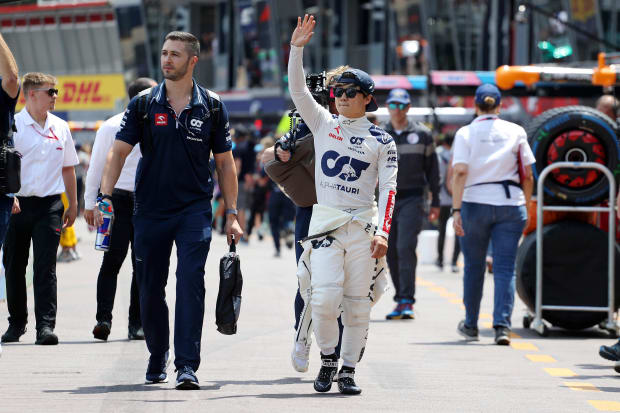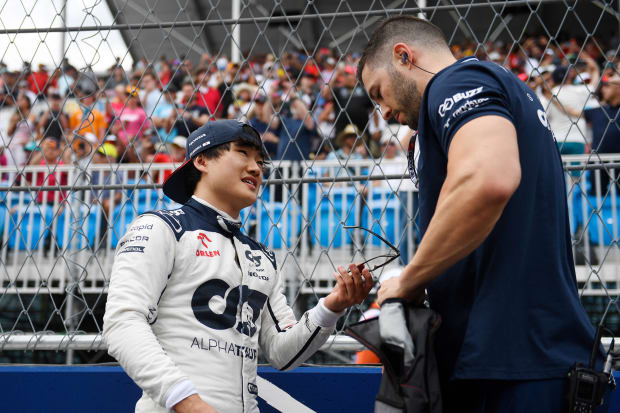There’s a common misconception about just how much strength and conditioning it takes to drive a Formula One car, week in and week out. With intense g-forces placed on drivers throughout the laps of a circuit, a race can certainly take a physical toll on the body. But it’s also equally important for drivers to be striving for peak performance mentally—that’s where Michael Italiano comes in.
Founder of MI Coaching, Italiano is an F1 performance and strength and conditioning coach who works directly with drivers to improve in physical and mental areas that could ultimately give them an edge on the track. He’s previously worked with eight-time race winner Daniel Ricciardo throughout his stints at Red Bull Racing, Renault and McLaren, and currently works with AlphaTauri’s Yuki Tsunoda.
Below, Italiano details his line of work, his tips for dealing with the high-pressure environment of F1, how he started to work for Ricciardo, Tsunoda’s extraordinary food obsession and more.
The following has been lightly edited for clarity.

Red Bull Content Pool
Sports Illustrated: How did you find yourself working in Formula 1?
Michael Italiano: I’ll probably say initially, a bit of luck and good timing. I was a strength conditioning coach back in Perth, Western Australia, and I got randomly offered the job by Daniel Ricciardo at the end of 2017. We knew each other and were friends prior, but we never really spoke about working together. Then he just threw the opportunity my way l, which definitely caught me by surprise. I started with him in 2018, and the rest has been a bit of a blur, but it’s been a fast and fun journey since.
SI: Were you a big F1 fan before you took the job?
MI: No, I’d be lying if I said I was a fan. I was following Ricciardo’s journey with interest, being a Perth boy, and seeing how far he got on the world stage, but I wasn’t a race fan at all.
SI: Interesting. Do most drivers have a performance coach? Is this a fairly new position in the championship?
MI: Generally, every driver has some sort of performance coach, whether it’s a strength conditioning coach, or a physiotherapist or someone within the sports science field.
SI: Did Daniel tell you why he wanted a performance coach in his life and why he reached out to you in the first place?
MI: To be honest, I never really asked him. I think he was in that stage of his career where maybe he wanted someone a little bit closer to home around him. You know, whilst travelling so much, it can be a little bit of a lonely life at times. So maybe having someone closer to home would best suit him. I never generally asked him the question as to why he reached out, but I’m glad he did.
SI: You spent a lot of time together in lockdown on his farm in Australia. It’s certainly a unique experience to have your coach with you during a period of such uncertainty. Do you think you helped him keep focused in a time of real unknown?
MI: Probably the opposite! It gave him a bit of time to disengage from the sport, and just have a bit of time to himself. That also gave us time to realign our fitness goals, and we essentially had three months to prepare, which was really good. Usually, we only get about one and a half, or six to eight weeks of preseason, whereas we had all three months of uninterrupted time together. It was good for me, because I could obviously plan and periodize his training with no distractions. At the same time, I think it gave him a chance because he’d been doing the sport for over 10 years. So I think the three months probably was a good thing for him just to completely unwind and just stay home for starters. You know, being home for three months, he probably hadn't done that in 15 years. So just seeing family and maybe living a little bit of a normal life.
SI: Formula 1 is a sport fueled by so much emotion. There’s pressure wherever you turn, whether that’s from fans on social media, the press, or from within your own team. How do you keep your athletes mentally strong when dealing with tough days, because they do happen?
MI: It’s very individual on how you deal with certain mental stresses, whether it’s internal or external. From my side it’s making sure that these guys clear their head before race weekend. I think it’s pretty difficult to assume that your athlete is going to have a clear head every week when there’s so much going on. Distractions are always going to be something in the back of their mind. I like to do a midweek spill on Wednesdays, where we splurge on what’s bothering us and what’s on our mind, get on the table and talk about it. Just be a little bit vulnerable with each other, which I think is a fantastic way to build trust, but also it’s a sense of relief that you can actually just sit there and talk about something that’s bothering you. Then you go into the race weekend with a little bit less tension on yourself, or in your mind. I do feel that a clearer mind and a happy athlete will always perform very, very well. I don’t think you can prevent the mental stresses; I think they’re always going to be there. It’s just about finding ways to cope and manage mechanisms in place.
SI: After Ricciardo announced he would not be racing this season, how did your current partnership with Yuki Tsunoda come about? Did you reach out to him, or was it the other way around?
MI: It came very late in the 2022 season, probably Brazil, which was the penultimate race of the year. His previous coach at the time approached me about the role. [Ricciardo] was having a baby this year so wanted to not travel as much, which I completely understand. He came to me and said, “I think from a matchup perspective, when it comes to just personalities you’d be really good for Yuki.” I went away and had a bit of a think, then I had a meeting with Christian Horner [Red Bull Racing team principal] and Dr. Helmut Marko [Red Bull Racing adviser] to understand their expectations around Yuki, and they wanted me to come on board as well. Then the last thing was to sit down with Yuki and just make sure that he was O.K., so after the Abu Dhabi Grand Prix, we went for coffee for about an hour and a bit. We just had a general chitchat, nothing to do with training, and I just kind of wanted to see if it felt right for him. So after that coffee, fortunately, he said it felt right, so we met in Dubai in January and went on a training camp and we had a blast. It was great.
SI: Tsunoda’s race team, AlphaTauri, is part of the Red Bull Racing family. You spent some time there working with Ricciardo in 2018. Are you enjoying being back there?
MI: Yeah, exactly. I loved that season. I love the people involved in Red Bull and credit to them five years on, there’s still a lot of familiar faces. So yeah, walking in there. Obviously, AlphaTauri is a completely different team in the garage, but when you share the energy station at European races, it does feel quite homely because I still see a lot of familiar faces. It’s very nice to be back.

Red Bull Content Pool
SI: Tsunoda received a five-second time penalty after the most recent Spanish Grand Prix for forcing another driver off the track. This pushed him out of the points, going from ninth to 12th, and Tsunoda was not at all happy about it. How did you debrief with him after the race?
MI: I gave Yuki a good 24 hours to vent, and to his credit, it probably only lasted three hours. I think by the time we were in a transfer heading to our flight, he was back smiling and we were joking. Usually I give 24 hours to vent because these guys are competitors, and this has a stronger meaning to them than what people probably understand. In some ways, it’s a little bit of their identity at times. And, especially for Yuki, it was such a tough race. It was hard, quite physical and he was always in a battle so there was no time to rest in that car. When you come out of the car thinking you’ve finished ninth, and then your engineer comes on the radio after the race and tells you the bad news, it’s going to sting. He’s probably suffered a little bit the last two weeks with fantastic driving but with no results, but I’m in no doubt that with suffering comes success. So I think his days will come, and he has had a very good consistent first five races as well.
SI: When we’ve seen Tsunoda appear in the hit Netflix show, Drive to Survive, and he appears to hate exercise and any kind of working out. What’s that been like working with him and trying to get him to enjoy it?
MI: I think that comes with maturity. That interview was probably like three years ago, and he’s come a long way since then. He still speaks his mind, but I think it’s a very positive trait of his. He will always be honest and speak his mind and he’s not a little puppet that’s being told what to say. I do respect him for that. He also understood that: “If I do want to be great at this sport and if I do want to improve, I do need to start taking care of my body and my mind.” Look, I’ll be honest, since I’ve taken over, he’s been unbelievable.
SI: Are you going to take all the credit for that?
MI: Ha, no, not at all. I definitely won’t take all the credit. If I make him do extra extra work, there’s no ifs or buts; he just gets on with it and does it. It’s just fantastic to be a coach with someone who’s just so motivated and determined to just get better. From a physical standpoint, he was fatiguing a lot in the races with shoulder pain and neck fatigue. This year, he’s not getting any of that. He started to understand that over the course of these years of training, it’s helping his driving ability a lot and conditioning his body well, to a point where he can actually race a lot better without any discomfort, pain or fatigue.
SI: Is Tsunoda as food-obsessed as he is made to be from the outside? He’s suggested several times that he wants to open his own restaurant one day.
MI: Oh, yeah, times 10. Always. To the point where he was in London for a day yesterday and he drove me to his favorite Japanese restaurant. So we had an absolute feast last night. If I’m in the vicinity, it’s like a must.







